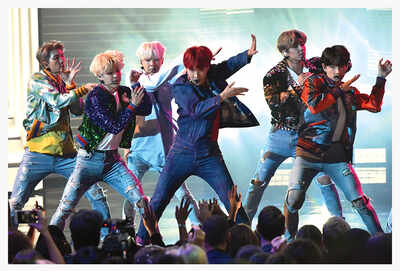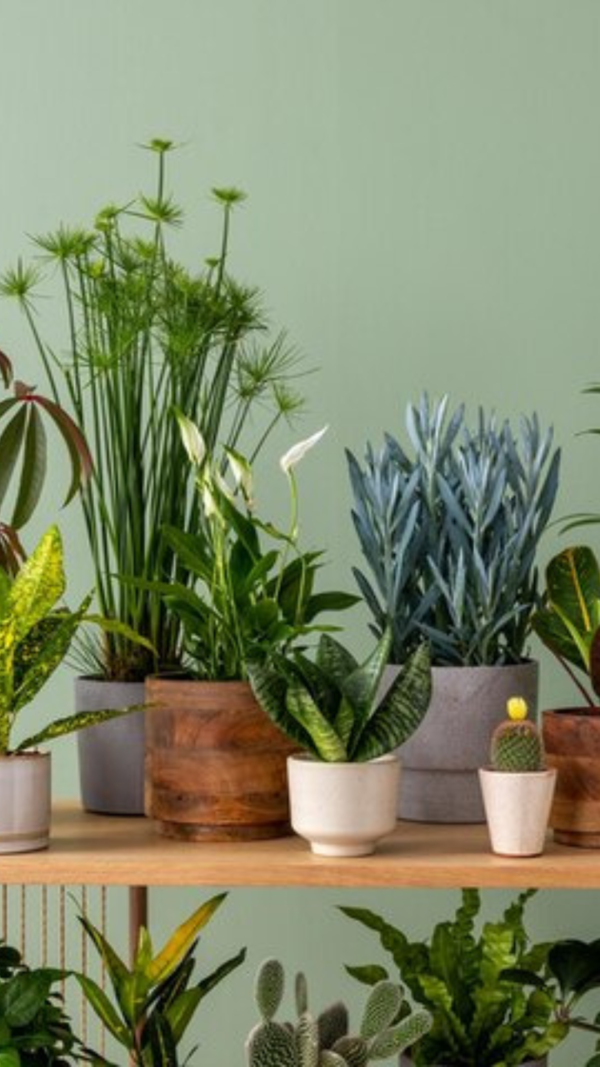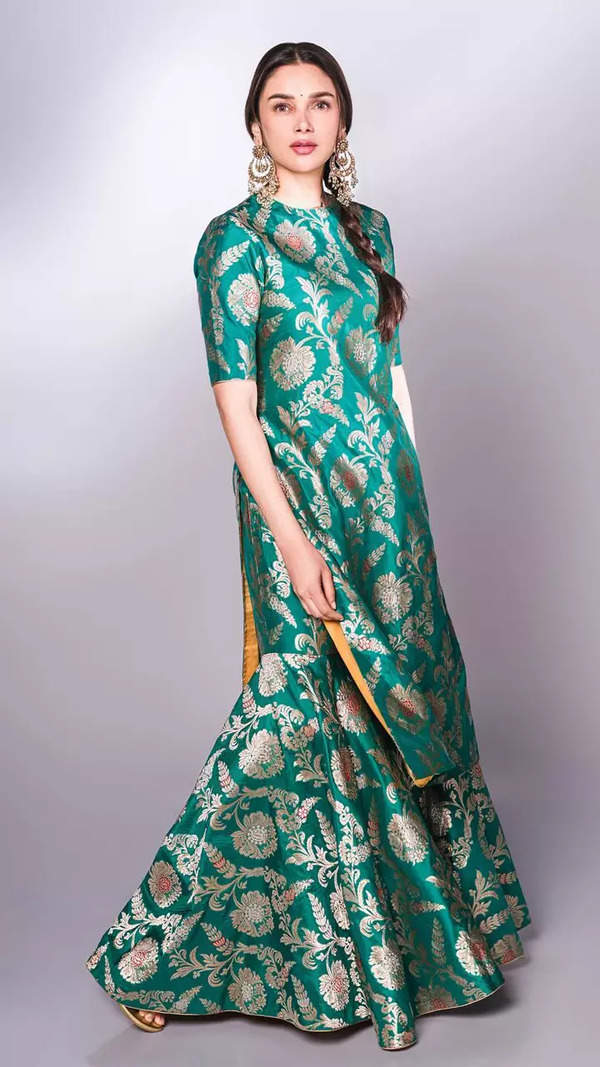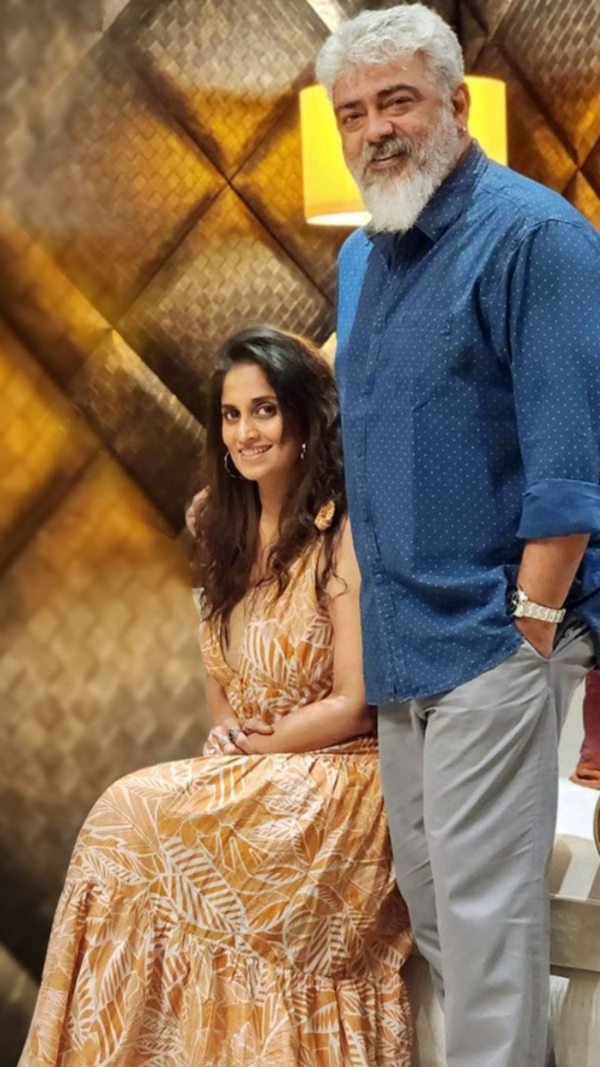Trending
This story is from July 18, 2019
Indian millennials are riding the Korean wave
From K-pop to K-dramas and kimchi, Indian youngsters are increasingly getting hooked to all things Korean.

As her alarm goes off at 6 am, Shivani Salunke starts her day listening to her favourite K-Pop song – Likey – by the all-girl band Twice. In fact, her playlist is filled with K-Pop numbers by bands such as BTS. And the walls of her room are plastered with posters of all her favourite South Korean TV stars. Her bag, cell phone cover – why, even the beauty products she uses – are all inspired by Korean pop culture.
Shivani, a 21-year-old creative arts student from Pune, calls herself a ‘Koreaboo’ – a word used to describe a person who is overly obsessed with Korean culture. She isn’t the only one.
Hallyu, a term that literally translates to ‘Flow of Korea’, refers to the growing popularity of South Korean culture across the globe – and India is currently in the grip of this wave.
The K-craze has caught up with millennials all over the country, who can’t get enough of South Korean music, shows, beauty products, language or food. What makes the culture so compelling to Indians?
Well, before they became a part of the mainstream in India, K-pop bands like BTS, EXO and TWICE – with their catchy tunes, colourful and impeccably-choreographed videos, and attractive members – had already captured the global imagination.
Talking about the rise of Korean pop culture here, Mumbai-based Indo-Korean culturist Dr John Sujina says, “It all started with South Korean music in the country. The music form gained popularity in the Northeastern states in India, particularly in Manipur, which is often called the starting point of Hallyu in India. When a ban was imposed on Indian entertainment content in the state in 2000, youngsters in Manipur looked to the far East for cultural content. And a racial affiliation with the Mongoloids, apart from their similar family values, drew them closer to Korean culture.”
While talking about why these tunes strike a specific chord with the desis, Kavita Tripathy, an ardent K-pop lover from Bangalore, explained, “K-pop is made up of a variety of concepts – dance, music, fashion and audio-visual elements – that come together to form a complete package. Also, it’s similar to Bollywood music – in that, it tells a story.”
Another die-hard fan of Korean music, Ashima Dasgupta from Kolkata, says, “K-pop also deals with mental health issues, the pressures the youth have to deal with, women empowerment and more. For example, I am a feminist and I watch the all-girl K-pop songs dealing with how a woman does not need any validation from someone. So, it resonates with its fans on different levels.”
Speaking of the K-pop fandom, Kavita tells us she’s part of a WhatsApp group of BTS followers, which has over 200 members. “It’s called the WhatsApp BTS Indian ARMY (BTS fans are called the ‘ARMY’),” she explains, adding, “We discuss everything related to BTS on that group. In fact, whenever BTS makes an appearance on any show, or they perform somewhere, people send photos. My phone’s memory is full of those pics.”
Dr Sujina adds that the demographic that K-Pop largely appeals to is people under the age of 25. Kim Kum-pyoung, director of Korean Cultural Centre India in New Delhi, says that now, the K-pop fever has even spread to smaller Indian towns. “KCCI organises a K-Pop contest every year. This year, we had 1,952 teams and 3,475 participants in the K-pop contest all over India. For the first time, we also had regional rounds in Guntur, Bhopal and Dehradun.”
Korean’s the new Chinese?
According to a recently-conducted restaurant survey by an Indo-Korean cultural centre in Mumbai, there are more than 45 standalone Korean restaurants in the country, and the number is growing – mostly in cities such as Chennai, Delhi, Pune, Bengaluru and Mumbai, with a sizeable population of Korean students and expats.

“Korean food is different from Indian, but the preparations and the way it’s fermented draws food connoisseur towards the cuisine,” says Siddharth Shukla, a chef who is learning Korean cuisine in Mumbai. “People are increasingly opting for Korean takeouts in the city and developing a taste for the cuisine. It won’t be wrong to say that Korean food is the new Chinese in India,” he adds.
K-beauty: A skin-deep obsession
Korean beauty products have also caught the fancy of youngsters across the country. “The 10-step Korean beauty skincare routine – which includes of cleansing, moisturizing, dehydrating and face masks – is quite popular in India now. I follow quite a few Korean makeup artistes on Instagram, like Pony, and am inspired by this cool trend. I order Korean beauty products on the internet, and use them regularly,” says Sunaina Deshmukh, an MBA student from Pune.
Korean language courses gain popularity
Along with K-pop, K-drama, K-beauty and K-food, Korean language courses are gaining popularity among Indians as well. “Every year, more than 1,000 students are learning the Korean language in our centre itself,” says Kum-pyoung, adding, “Last year, we also launched the Korean language course in Indira Gandhi National Open University (IGNOU). Now, people from all over the country can learn the Korean language through IGNOU.”
“One of the main reasons why students are opting for the Korean language is mainly to enhance job opportunities in Korean companies. Another is because of their great love for K-pop. K-pop bands have a fan base in almost all parts of the country, and the desire to know the lyrics and meaning of the songs has driven youngsters to learn the language,” he adds.
Sangeeta Pun, 25, who is doing her Masters in Sociology from IGNOU and has been following K-dramas and K-pop since 2013, tells us, “I’m currently hooked to Hwarang, a K-drama. However, while watching with subtitles, you’re not able to focus on the screen as you keep looking at the text to understand what’s happening. That’s why I wanted to learn Korean – so that I could focus on the actors and their expressions and dialogue.” Ashima too admits her love for K-pop songs has inspired her to learn the Korean language.
Move over desi K-serials; K-dramas are the new fad in town!
Another Korean cultural import India can’t get enough of? K-dramas. Shows like You Are My Destiny and Guardian: The Lonely And Great God are now on the must-watch TV list of youngsters, with many preferring them to US or Brit series.

“As an Indian viewer, Korean shows are more relatable than the US or British shows for simple reasons – such as the leads being afraid of letting their parents know they’re dating someone, which wouldn’t even be a concern in Western shows,” says Kashika Saxena, a 29-year-old journalist.
Subalaxmi Iyer, a PhD student from Chennai, who has been watching Korean dramas since 2007, agrees, “The cultural similarities between the two nations fascinates me. For instance, they have a lot of respect for elders, like us, which is beautifully depicted in their dramas. They also laugh and cry from the gut, like most of us.”
Dr John adds, “Their shows are not too sexual in content, and they believe in family values – all of this resonates with the viewers in India.” Kum-pyoung also links the growing popularity of K-dramas to India’s love for K-pop, as “there are many K-pop stars who are acting in K-drama.”
Shivani, a 21-year-old creative arts student from Pune, calls herself a ‘Koreaboo’ – a word used to describe a person who is overly obsessed with Korean culture. She isn’t the only one.
Hallyu, a term that literally translates to ‘Flow of Korea’, refers to the growing popularity of South Korean culture across the globe – and India is currently in the grip of this wave.
The K-craze has caught up with millennials all over the country, who can’t get enough of South Korean music, shows, beauty products, language or food. What makes the culture so compelling to Indians?
Catchy tunes, meaningful lyrics: Why India can’t get enough of K-pop
Well, before they became a part of the mainstream in India, K-pop bands like BTS, EXO and TWICE – with their catchy tunes, colourful and impeccably-choreographed videos, and attractive members – had already captured the global imagination.
Talking about the rise of Korean pop culture here, Mumbai-based Indo-Korean culturist Dr John Sujina says, “It all started with South Korean music in the country. The music form gained popularity in the Northeastern states in India, particularly in Manipur, which is often called the starting point of Hallyu in India. When a ban was imposed on Indian entertainment content in the state in 2000, youngsters in Manipur looked to the far East for cultural content. And a racial affiliation with the Mongoloids, apart from their similar family values, drew them closer to Korean culture.”
While talking about why these tunes strike a specific chord with the desis, Kavita Tripathy, an ardent K-pop lover from Bangalore, explained, “K-pop is made up of a variety of concepts – dance, music, fashion and audio-visual elements – that come together to form a complete package. Also, it’s similar to Bollywood music – in that, it tells a story.”
Another die-hard fan of Korean music, Ashima Dasgupta from Kolkata, says, “K-pop also deals with mental health issues, the pressures the youth have to deal with, women empowerment and more. For example, I am a feminist and I watch the all-girl K-pop songs dealing with how a woman does not need any validation from someone. So, it resonates with its fans on different levels.”
Speaking of the K-pop fandom, Kavita tells us she’s part of a WhatsApp group of BTS followers, which has over 200 members. “It’s called the WhatsApp BTS Indian ARMY (BTS fans are called the ‘ARMY’),” she explains, adding, “We discuss everything related to BTS on that group. In fact, whenever BTS makes an appearance on any show, or they perform somewhere, people send photos. My phone’s memory is full of those pics.”
Dr Sujina adds that the demographic that K-Pop largely appeals to is people under the age of 25. Kim Kum-pyoung, director of Korean Cultural Centre India in New Delhi, says that now, the K-pop fever has even spread to smaller Indian towns. “KCCI organises a K-Pop contest every year. This year, we had 1,952 teams and 3,475 participants in the K-pop contest all over India. For the first time, we also had regional rounds in Guntur, Bhopal and Dehradun.”
Korean’s the new Chinese?
According to a recently-conducted restaurant survey by an Indo-Korean cultural centre in Mumbai, there are more than 45 standalone Korean restaurants in the country, and the number is growing – mostly in cities such as Chennai, Delhi, Pune, Bengaluru and Mumbai, with a sizeable population of Korean students and expats.

“Korean food is different from Indian, but the preparations and the way it’s fermented draws food connoisseur towards the cuisine,” says Siddharth Shukla, a chef who is learning Korean cuisine in Mumbai. “People are increasingly opting for Korean takeouts in the city and developing a taste for the cuisine. It won’t be wrong to say that Korean food is the new Chinese in India,” he adds.
K-beauty: A skin-deep obsession
Korean beauty products have also caught the fancy of youngsters across the country. “The 10-step Korean beauty skincare routine – which includes of cleansing, moisturizing, dehydrating and face masks – is quite popular in India now. I follow quite a few Korean makeup artistes on Instagram, like Pony, and am inspired by this cool trend. I order Korean beauty products on the internet, and use them regularly,” says Sunaina Deshmukh, an MBA student from Pune.
Korean language courses gain popularity
Along with K-pop, K-drama, K-beauty and K-food, Korean language courses are gaining popularity among Indians as well. “Every year, more than 1,000 students are learning the Korean language in our centre itself,” says Kum-pyoung, adding, “Last year, we also launched the Korean language course in Indira Gandhi National Open University (IGNOU). Now, people from all over the country can learn the Korean language through IGNOU.”
“One of the main reasons why students are opting for the Korean language is mainly to enhance job opportunities in Korean companies. Another is because of their great love for K-pop. K-pop bands have a fan base in almost all parts of the country, and the desire to know the lyrics and meaning of the songs has driven youngsters to learn the language,” he adds.
Sangeeta Pun, 25, who is doing her Masters in Sociology from IGNOU and has been following K-dramas and K-pop since 2013, tells us, “I’m currently hooked to Hwarang, a K-drama. However, while watching with subtitles, you’re not able to focus on the screen as you keep looking at the text to understand what’s happening. That’s why I wanted to learn Korean – so that I could focus on the actors and their expressions and dialogue.” Ashima too admits her love for K-pop songs has inspired her to learn the Korean language.
Move over desi K-serials; K-dramas are the new fad in town!
Another Korean cultural import India can’t get enough of? K-dramas. Shows like You Are My Destiny and Guardian: The Lonely And Great God are now on the must-watch TV list of youngsters, with many preferring them to US or Brit series.

Shows like You Are My Destiny and Guardian: The Lonely And Great God are now on the must-watch TV list of youngsters
“As an Indian viewer, Korean shows are more relatable than the US or British shows for simple reasons – such as the leads being afraid of letting their parents know they’re dating someone, which wouldn’t even be a concern in Western shows,” says Kashika Saxena, a 29-year-old journalist.
Subalaxmi Iyer, a PhD student from Chennai, who has been watching Korean dramas since 2007, agrees, “The cultural similarities between the two nations fascinates me. For instance, they have a lot of respect for elders, like us, which is beautifully depicted in their dramas. They also laugh and cry from the gut, like most of us.”
Dr John adds, “Their shows are not too sexual in content, and they believe in family values – all of this resonates with the viewers in India.” Kum-pyoung also links the growing popularity of K-dramas to India’s love for K-pop, as “there are many K-pop stars who are acting in K-drama.”
End of Article
FOLLOW US ON SOCIAL MEDIA








